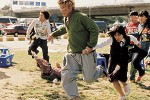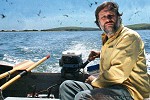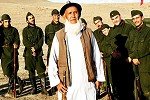 Arthouse films ’06
Arthouse films ’06THE PERVERT'S GUIDE TO CINEMA | 37 USES FOR A DEAD SHEEP
< < M O R E | M O R E > >
last update 4.Oct.06
See also: SHADOWS FILM FESTIVAL | SHORT FILMS
 R E V I E W B Y R I C H C L I N E
R E V I E W B Y R I C H C L I N E
 Documenting the world's first solo round-the-world sailing race in 1968-69, filmmakers Osmond and Rothwell assemble a remarkably gripping and emotionally wrenching tale of the human mind stretched to the breaking point.
Documenting the world's first solo round-the-world sailing race in 1968-69, filmmakers Osmond and Rothwell assemble a remarkably gripping and emotionally wrenching tale of the human mind stretched to the breaking point.
After Francis Chichester became the first man to sail around the globe in 1967, with one stop in Australia, the Sunday Times launched its Golden Globe Race to crown a solo nonstop champion. Nine men entered--eight veterans and one unknown, Donald Crowhurst. Without any proper checks or security measures, the Times sent these men into the open seas. And this documentary for the first time pieces together Crowhurst's true journey. Which wasn't remotely what anyone thought it would be.
Using film shot by Crowhurst and other competitors, as well as audiotapes and journal entries, the filmmakers tell the story so vividly that we live it along with their friends and families. The imagery is remarkable, using footage from all kinds of sources, including some gorgeous new cinematography and Swinton's haunting narration alongside both historical and modern-day witnesses.
What emerges is a sober examination of how gruelling such a stunt must have been--months at sea all alone, without today's GPS and communications systems, facing some of the roughest oceans on earth. In addition to the detailed account of Crowhurst's voyage, the film also follows Knox-Johnston, the race winner and one of the interviewees here, and Bernard Moitessier, whose wife talks about his intriguing personal journey (accompanied by the beautiful footage he shot) and how he didn't want the race to end.
Viewers unfamiliar with the story will be surprised by the constant twists and turns. Preparation sequences are washed in doubts and shadows, followed by the exhilaration of the open seas. Osmond and Rothwell have expertly edited a wealth of material to tell the full story beautifully. And where it becomes something much more is in its intimate look at a man pushed in to a corner where reality just isn't as perfect as the idea was. It's amazing--and terrifying--what a man will do when consumed with self-delusion and faced with humiliation and panic. And this is what makes the film unforgettable.
narr Tilda Swinton
with Clare Crowhurst, Simon Crowhurst, Robin Knox-Johnston, Ron Winspear, Francoise Moitessier de Cazalet, Ted Hynds, Donald Kerr, Santiago Franchessi

release UK 15.Dec.06,
US 24.Aug.07
06/UK FilmFour-Pathe 1h33

3.Oct.06
 R E V I E W B Y R I C H C L I N E
R E V I E W B Y R I C H C L I N E
 Like a delightfully unhinged version of a 1960s Japanese monster movie, this Korean thriller piles on character detail, political comment and comedy asides while a grisly creature romps through the city.
Like a delightfully unhinged version of a 1960s Japanese monster movie, this Korean thriller piles on character detail, political comment and comedy asides while a grisly creature romps through the city.
Gang-du (Song) is a slacker reluctantly working in the river-front food stall owned by his father (Byun) and just about keeping an eye on his pre-teen daughter Hyun-seo (Ko). One afternoon, what looks like a gigantic catfish with feet and a prehensile tail lunges out of the river and starts dragging people away, including Hyun-seo. Gan-du teams up with his father, brother (Park Hae-il) and sister (Bae) to rescue her, but the American military wants to quarantine this "infected family"--and most of Korea--from a virus they think this creature is hosting.
An opening prologue establishes the cause for this mutation--more Americans, of course--and while this is about as far as the political commentary goes, it's still pretty potent. And sharply witty. Especially as the public goes into a blind panic, wearing surgical masks (where have we seen this recently?). Or when the military releases "Agent Yellow" to kill the virus, the creature and any protesters who might get in the way.
Director Bong (Memories of Murder) gleefully galumphs through a simple story that's beefed up with crisp characters and humour that's both sharp and silly. Even the hideous creature has a subtly comical edge. While the astute B-movie-style performances both heighten realism and poke fun at it. When the family collapses in hysterical heartache, our reaction can't be anything but laughter. We feel their pain, but their explosion of grief is hilariously over-the-top, especially as the paparazzi start snapping away.
Layering this against arrogant government overreaction and cynical rebellion is just brilliant. Yes, it's been done before, but not in the current world climate with cutting-edge effects (the beast was designed by Peter Jackson's pals at Weta). As a whole, the film feels a little long, but this allows each character to find unexpected courage in the face of unthinkable horror. And it's so funny that you don't really want it to end.
scr Bong Joon-ho, Hah Joon-won, Baek Chul-hyun
with Song Kang-ho, Byun Hee-bong, Park Hae-il, Bae Doo-na, Ko A-sung, Lee Dong-ho, Lee Jae-eung, Yoon Je-moon, Kim Roi-ha, Park No-syk, Scott Wilson, David Joseph Anselmo
 release Kor 27.Jul.06,
release Kor 27.Jul.06, UK 10.Nov.06,
US 9.Mar.07
06/Korea 1h55
CANNES FILM FEST
TORONTO FILM FEST
22.Sep.06
 R E V I E W B Y R I C H C L I N E
R E V I E W B Y R I C H C L I N E
 It's odd to refer to a two-and-a-half-hour documentary as a whirlwind tour, but that's what it is. Filmmaker Fiennes and philosopher Zizek take a provocatively deep look at cinematic history, and the result is brisk, entertaining and, yes, intense.
It's odd to refer to a two-and-a-half-hour documentary as a whirlwind tour, but that's what it is. Filmmaker Fiennes and philosopher Zizek take a provocatively deep look at cinematic history, and the result is brisk, entertaining and, yes, intense.
The first of three segments looks at what films tell us about the subconscious. Much of this is Freudian, examining how fantasy and reality struggle for control of our thoughts. Primary examples here are The Matrix, The Birds and, of course, Psycho, with its superego/ego/id imagery (which Zizek points out is also echoed in larger-than-life Groucho, rational Chico and aggressively childish Harpo Marx). Zizek also plunders films that wallow in the dark side, such as The Great Dictator, Dr Strangelove, The Exorcist, The Conversation, Vertigo, Fight Club, Mulholland Drive and Blue Velvet.
Part 2 examines the role of fantasy in sexual relationships, and how films grab us with the tension between love and guilt and the mysteries of feminine subjectivity. Again,Vertigo is a primary example, along with Tarkovsky's Solaris, Bergman's Persona and more contemporary examples like Eyes Wide Shut, The Piano Teacher, Three Colours Blue and the entire David Lynch oeuvre (including an intriguing look at how Lost Highway and Mulholland Drive are actually two versions of the same story).
And finally, Zizek looks at how movies capitalise on deceptive appearances; they're even more effective when we know they're staged fictions (like the extreme example, Dogville). In other words, movies feel more real that reality, and pulling back the curtain in The Wizard of Oz means nothing, because the wizard still helps Dorothy and company. Other examples include Tarkovsky's Stalker and, again, everything by Hitchcock and Lynch. Zizek closes with a striking look at City Lights, and how Chaplin examines perception and reality in ways that are far more sophisticated than his audience realises.
Fiennes' most inventive touch is to place Zizek in recreations of these films' sets, plus visits to actual locations. This grounds the film in ways that Zizek's constant rambling doesn't. It's virtually impossible to get everything he says, but dipping in and out we get insightful and witty observations that help us understand why cinema is so magical and compelling. Zizek's obsessions with Lynch and Hitchcock are certainly appropriate, but it's strange that there's only one Bergman and nothing from Fellini, Polanski or Cronenberg. As a whole, the doc is dense and often impenetrable, but it also feels like a particularly meaty film course. And the clips are pure bliss.
with Slavoj Zizek
 release UK 6.Oct.06
release UK 6.Oct.0606/UK FilmFour 2h30
TORONTO FILM FEST
29.Sep.06
 R E V I E W B Y R I C H C L I N E
R E V I E W B Y R I C H C L I N E The Story of the Pamir Kirghiz
The Story of the Pamir Kirghiz
 This inventive documentary examines a specific ethnic group over the past century as they migrated from place to place in search of a home. It's entertaining and extremely clever, letting the subjects tell their own story with humour and personality.
This inventive documentary examines a specific ethnic group over the past century as they migrated from place to place in search of a home. It's entertaining and extremely clever, letting the subjects tell their own story with humour and personality.
The Pamir Kirghiz lived for centuries in the high mountains where Afghanistan and China meet. When Stalin took power, they saw their culture being systematically destroyed, so they moved east into China. But it wasn't long before Mao Tse-tung emerged, and they were forced to run again, this time to a harsh, isolated corner of Afghanistan. A few decades later the Soviets came here as well, and the Kirghiz moved south into the much hotter Pakistan, which didn't suit their lifestyle at all. After four years, they were invited to move to eastern Turkey, where they've been since 1982.
Filmmaker Hopkins tells this story in a post-modern style, as we follow his film crew into Turkey, where he meets the Kirghiz and encourages them to re-enact the key events in period film styles. Some of the storytellers are now in their 90s, and their memories are vividly detailed as they talk about the resilience of the tribe, which is due to two things, basically: first is their inventive use of sheep for meat, dairy, wool, leather, dung--anything they need. And second is the tenacity of their leader Haji Rahman Qul, who died in 1990.
What makes the film so thoroughly engaging is their sense of humour as they tell their stories and then recreate them on film. Segments are shot in styles from Charlie Chaplin silents and 1970s travelogues. And as it progresses, the film really catches the massive shifts and upheaval along the Silk Road, through the opium trade and now as their culture is being diluted by Europe. It's strange that the nation of Kirghizstan is never mentioned at all; it'd be interesting to know why. And the film is a bit anecdotal and fragmented. But it's also a captivating look at how the world has changed--and is changing--before our eyes.
with Ekber Kutlu, Ben Hopkins, Arif Kutlu, Alpaslan Kutlu, Suleyman Atanisev, Ismail Atilgan, Sereban Aslan, Baki Bahader, Mehmet Emin Yildirim, Hayet Haji, Mehmet Dincer, Ozlem Kutlu
 release UK 17.Nov.06
release UK 17.Nov.0606/UK 1h27
Caligari Prize:
BERLINALE

25.Sep.06


See also: SHADOWS FILM FESTIVAL | SHORT FILMS
© 2006 by Rich Cline, Shadows
on the Wall